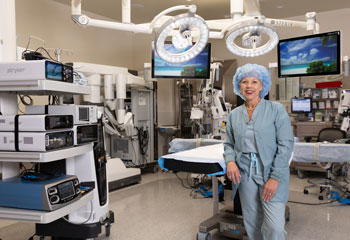
Heart Surgery
Sometimes heart surgery may be your best option for improving your symptoms and living a longer, more active life.
Our approach to heart surgery
If you have certain heart conditions, heart surgery can help you live longer and improve your quality of life. But we know that hearing you need heart surgery can be daunting.
Our team will make sure you know what to expect every step of the way.
Our highly experienced heart surgeons start by getting to know you and understanding how heart disease affects your life.
At your first appointment, your surgeon will discuss your:
- Condition
- Treatment options like coronary artery bypass grafting (CABG), valve repair or left ventricular assist device (LVAD)
- Functional capacity and activity level
- Treatment goals
- Lifestyle and career
- Home life and support network
This all helps your surgeon tailor a surgical plan around your health needs, goals and priorities. They’ll make sure you understand your condition and how heart surgery can address it.
Our goal is to educate and empower you to make the best healthcare decision for your specific needs.
Specializing in complex cases
Our heart surgeons also specialize in heart surgery for people who are considered high risk. So, if you’ve had previous open-heart surgery or other health challenges, UCI Health heart surgeons may be able to help.
We are experts in life-saving heart surgery even if you have:
- Heart valve disease or infection
- Complex aorta disease, such as ascending aorta
- Heart failure
- Kidney disease
- Other conditions like diabetes, lung disease or cirrhosis
Why choose UCI Health for heart surgery?
Cardiac ICU
After your heart surgery, you’ll recover in our cardiac intensive care unit (ICU). In this critical care unit, our team of specially trained heart specialists provide care specifically for people who’ve had heart surgery. This high level of expertise ensures that you receive the most effective, seamless care to help you recover after heart surgery.
Advanced technologies for complex heart surgeries
We can take on complex, high-risk surgeries thanks to a combination of experienced clinicians and advanced technology. We have the most up-to-date technology that helps support you when you come off the heart-lung machine after open-heart surgery. This includes left ventricular assist device (LVAD), temporary right ventricular assist devices and extracorporeal membrane oxygenation (ECMO).
Advanced heart surgeries not widely available
As the only academic health system in Orange County, UCI Health offers the most advanced heart surgery available. Our cardiac surgeons have excellent outcomes in common heart surgeries like CABG and transcatheter aortic valve replacement (TAVR). They’re also the only surgeons in Orange County who specialize in hybrid ablation for AFib and LVAD for heart failure. Whether you have a common or complex heart condition, our heart surgeons have a wide range of treatment options to help.
Minimally invasive coronary bypass surgery
Our heart surgeons offer minimally invasive coronary bypass surgery, which is only offered at select academic health systems nationally. This procedure allows us to perform bypass surgery without fully opening your chest with a sternotomy. Instead, we access your heart through a smaller incision between your ribs, and you don’t need to be put on a heart-lung machine. That means your recovery is faster, with less pain and a lower risk for complications.
Recovery after heart surgery
After heart surgery, you’ll have a multidisciplinary team of specialists helping you through recovery and back into activity. This starts when you’re recovering in the hospital after surgery. Our physical and occupational therapists get you up and walking and evaluate what you need to thrive in recovery. You’ll also have access to our cardiac rehab program that helps you recover more quickly and stronger after heart surgery.

Schedule an appointment
Our heart surgeons offer advanced treatment options for the full range of heart diseases, including coronary artery disease, aortic stenosis and more.
Call 714-456-6699 to make an appointment.

Find a Cardiology Clinical Trial
Talk to your doctor to see if a cardiology clinical trial is right for you.
Featured Blog Posts

Rethinking surgery for a next-generation hospital

A heart attack that strikes younger healthy women





